ARTICLE AD BOX
1 hour ago
By Shingai Nyoka, BBC News, Johannesburg

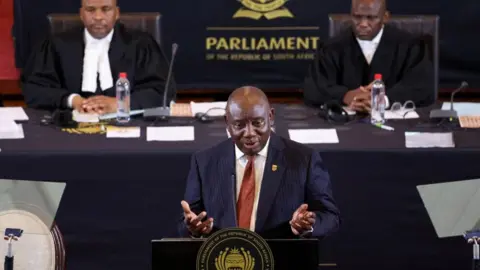 Reuters
Reuters
President Cyril Ramaphosa addressed lawmakers at a symbolic opening of parliament
South Africa parliament appears to have entered a new era - one of political maturity.
The atmosphere was remarkably different from what what had gone before - no interruptions, no chaos and no scuffles, as President Cyril Ramaphosa laid out plans for the first time since the coalition government took office.
This was a result of the African National Congress (ANC) failing to secure more than 50% of the vote for the first time in the democratic era.
Former President Jacob Zuma - who leads the uMkhonto weSizwe (MK) party but was barred from running as an MP just before May's election - snubbed the invitation to attend Thursday's sitting.
With the parliament now open, the MK - a party founded less than a year ago - was recognised as the official opposition.
Its leader of house, disgraced former Justice John Hlophe, had promised not to engage in petty politics.
- Impeached judge itching to take on South African president
- The winners and losers in South Africa's historic new government
Also, the Economic Freedom Fighters (EFF) - who have a reputation for disrupting, heckling and brawling in parliament - had promised to change, with party leader Juilius Malema saying the EFF would be a constructive opposition.
Members of the Democratic Alliance (DA) - formerly South Africa's official opposition but now part of the coalition government - nodded and clapped during an hour-long speech as the ANC's President Cyril Ramaphosa announced the top priorities.
These included rapid, inclusive economic growth, job creation and tackling the high cost of basic goods.
Mr Ramaphosa's humbled ANC had streamed into parliament with the least number of members since it came to power 30 years ago.
After losing its parliamentary majority, the ANC formed an initially shaky coalition with nine other political parties. Mr Ramaphosa’s address followed the coalition government's first cabinet meeting since the vote was held.
That meeting "underscored the determination of all members of the Government of National Unity to work together to advance the interests of all South Africans", he told parliament.

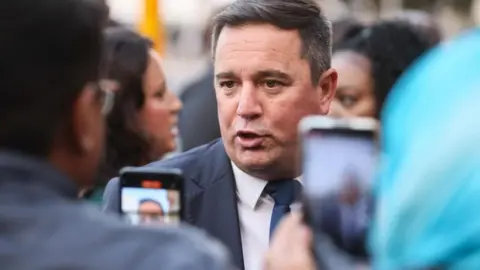 EPA
EPA
Previous a leader in opposition, John Steenhuisen is now part of the new coalition government
The priorities he has announced fuse mostly ANC policies with some concessions made to accommodate the concerns of the DA, South Africa's second-largest party and the ANC's long-time rival.
The pro-free market DA is ideologically at odds with the ANC's social welfare traditions, and seen by many as catering to the interests of the white minority, which it denies.
In his address, Mr Ramaphosa firmly stated economic growth must "support the empowerment of black South Africans and women and those who in the past had been relegated to the fringes of the economy".
The government, which is backed by 70% of the MPs, promises to make "massive" investments in infrastructure and turn the whole country "into a construction site".
The second area of focus will be to expand the basket of essential food items exempt from the VAT sales tax, in order to address the high cost of living.
This is an initiative that the DA had been lobbying for in an effort to eliminate poverty, TK Pooe, a senior researcher at the Wits School of Governance, told the BBC.
Another part-concession, the ANC’s plan to launch compulsory universal healthcare for all, will now proceed subject to consultation with stakeholders. The DA and private medical insurance groups had threatened legal action, arguing that the scheme violates the right to choose a service provider.
"Court will be the last resort," DA leader and Agriculture Minister John Steenhuisen told journalists outside parliament.
"We are in government now and have a forum in which we can negotiate." He welcomed Mr Ramaphosa's speech.
New sports minister Gayton McKenzie was also pleased, saying the address was Mr Ramaphosa’s "best" ever.
However, John Trollip from Action SA, a political party that is not part of the new government, said the president's address was thin on credibility and sounded like lots of previous speeches.
The EFF’s Mr Malema told national broadcaster SABC that "it’s very clear that the president has got no plan to transform South Africa for the better".

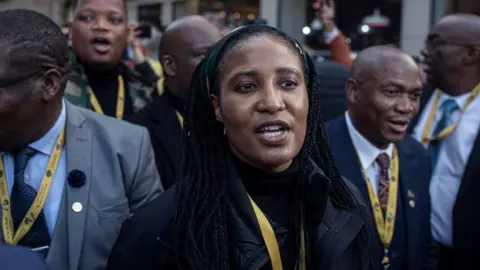 Getty Images
Getty Images
ExPresident Jacob Zuma's daughter, Duduzile Zuma-Sambudla, is one of the new MPs for the main opposition MK party
But Mr Pooe said what the president did not explicitly mention – foreign policy and the ANC's ties to Gaza and Russia - is equally important as the priorities he outlined.
"It'll be interesting to see how now the statements about Israel and Russia might become a bit more muted to accommodate the many voices in the room," he said, in reference to the DA's support of Israel.
The MK's John Hlophe agreed.
"He didn’t address the issue of Palestine because the DA is watching him," he said. Mr Hlophe added that the speech was "appalling" and silent on land reform without compensation - a central MK policy as well as a key issue nationally.
White people, who make up just 7% of the population, own the vast majority of farmland that is held by individuals.
There has long been a debate about whether the state should redistribute this land without paying its owners for it.
Mr Pooe believed the president's speech did not over-promise.
"We are not expecting to see radical change and that might be a positive. [The speech said] these are the choke points holding the country back: energy, infrastructure local government and this is what is going to be addressed," he said.
"If the grand coalition can stick to those things and then allow private actors to come in on the other matters the better for South Africa."
Perhaps deliberately, the opening of parliament coincided with the birthday of the country's first democratically elected President, Nelson Mandela, who at the time symbolised hope and renewal for a nation in crisis.
Thursday might not have recaptured that hope entirely. But Mr Ramaphosa said the unity government would "seek to build consensus on issues we don’t agree on".
He acknowledged that they would have to work hard to reach this consensus.
You may also be interested in:

 Getty Images/BBC
Getty Images/BBC

 6 months ago
37
6 months ago
37
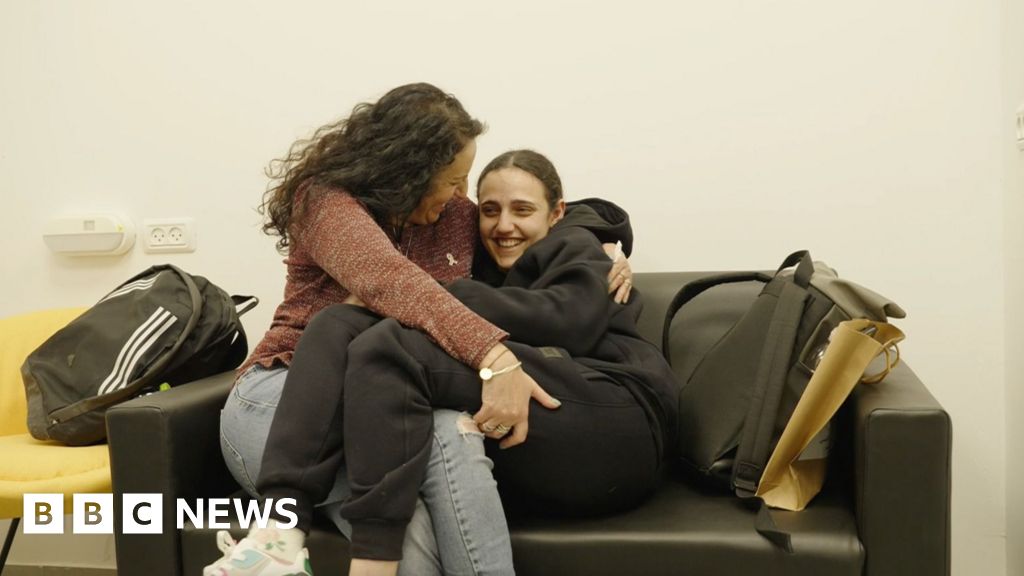
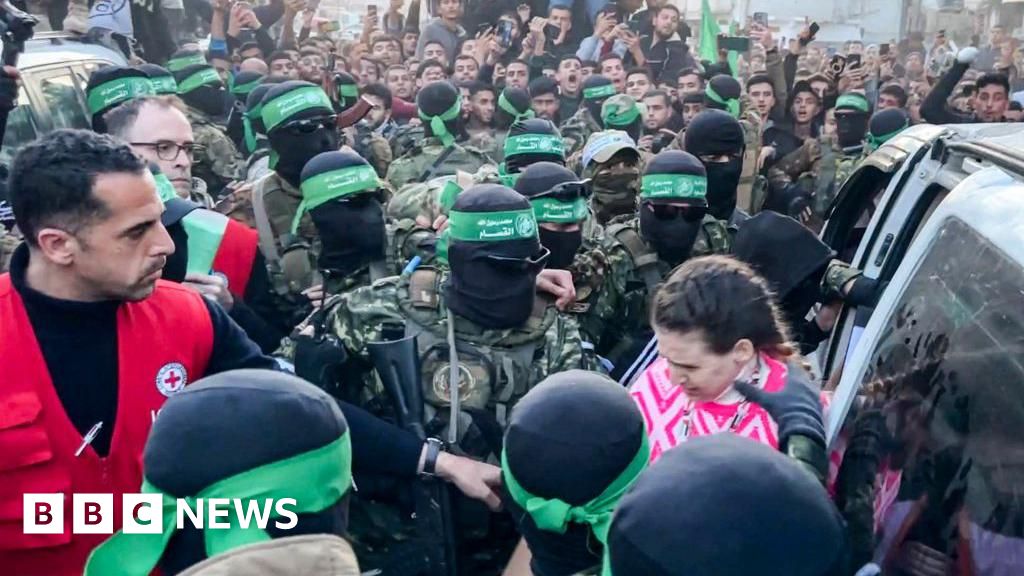
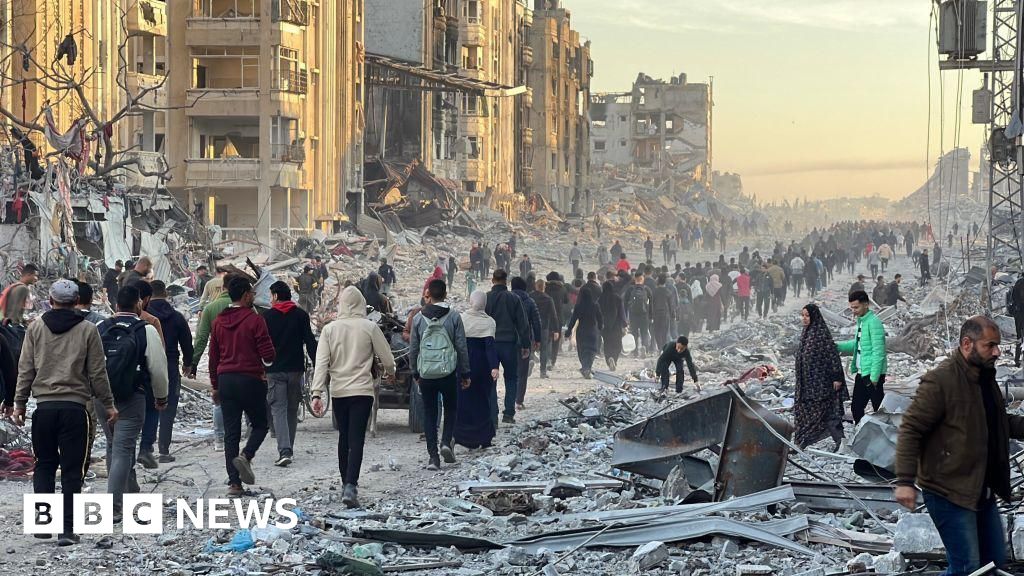





 English (US) ·
English (US) ·